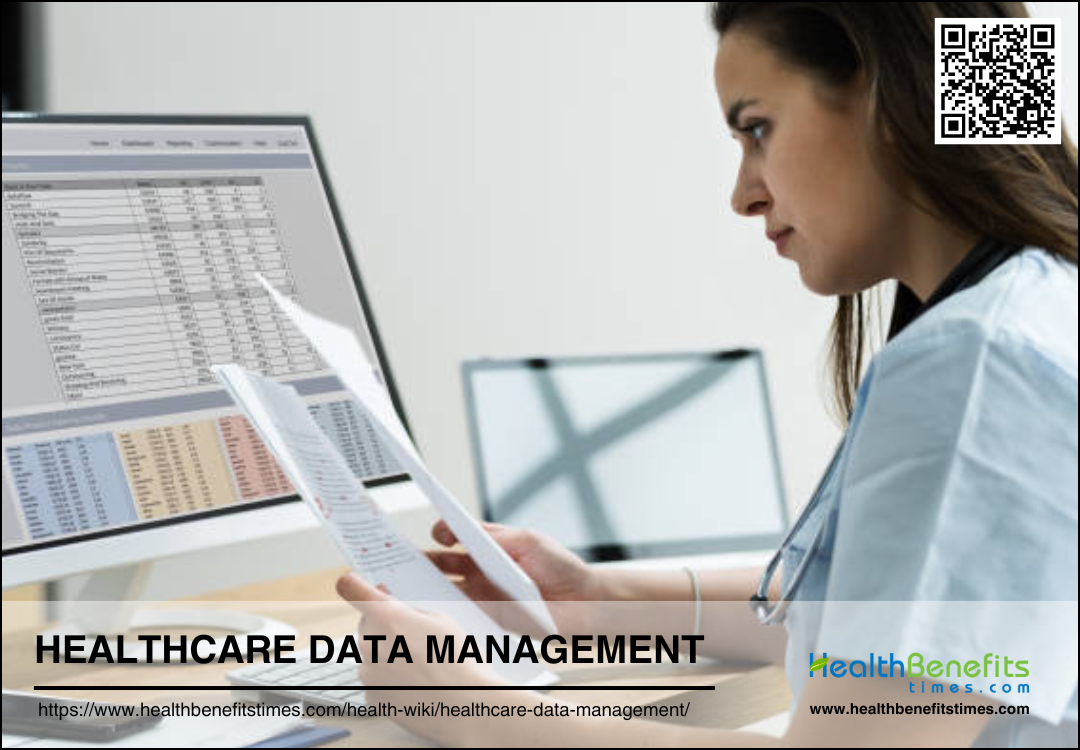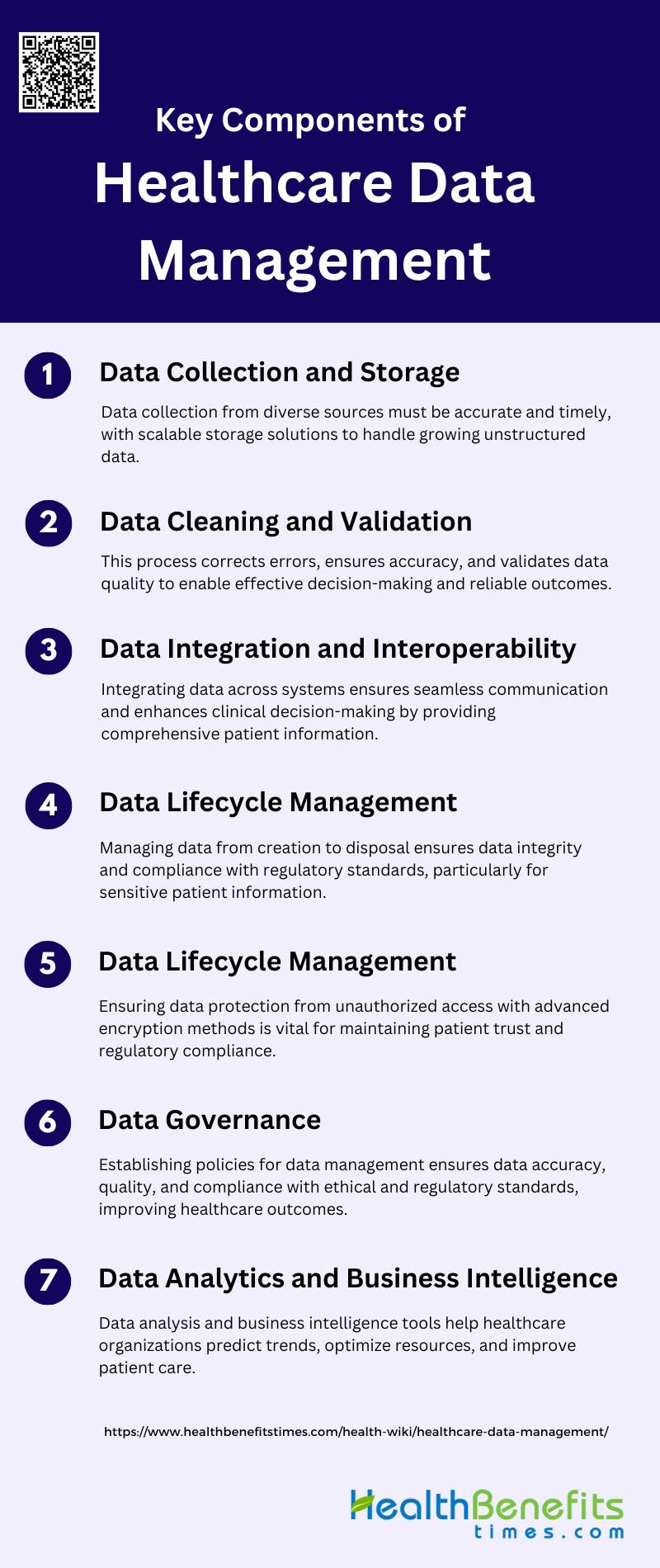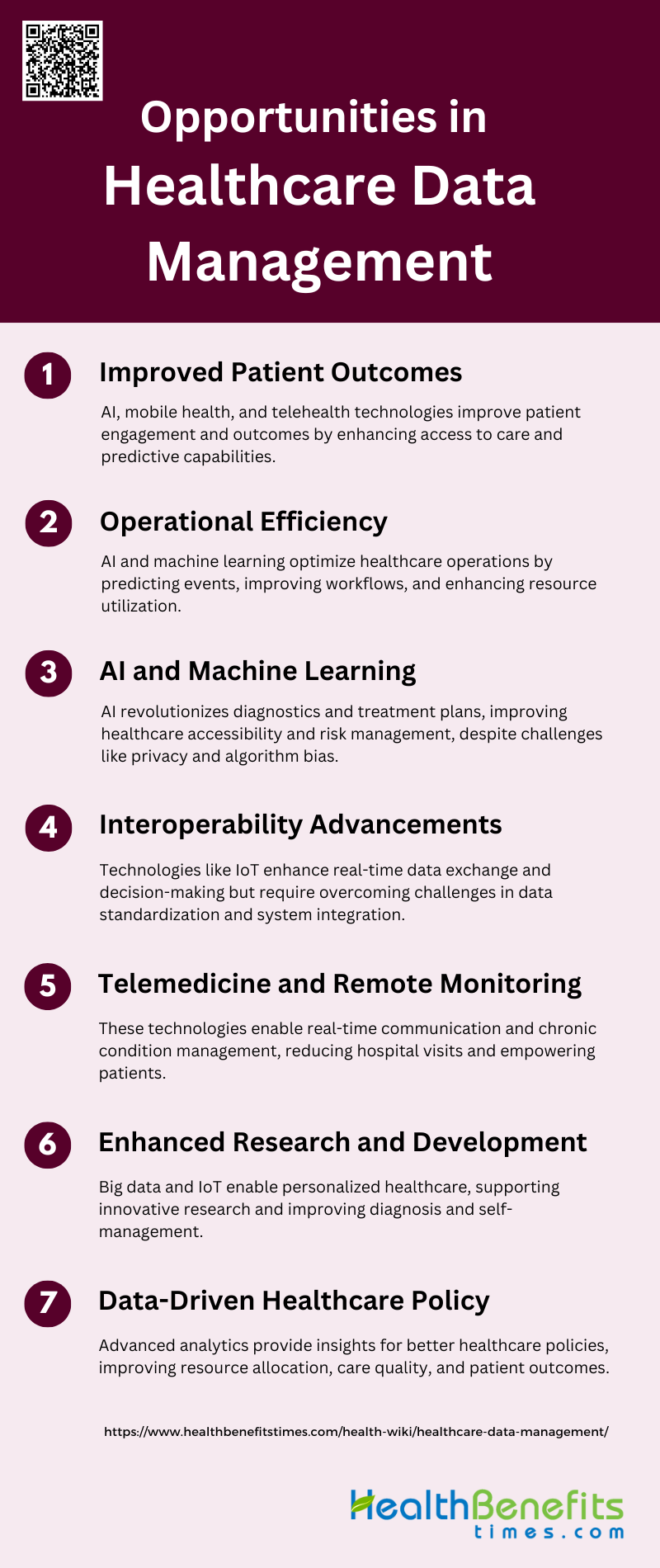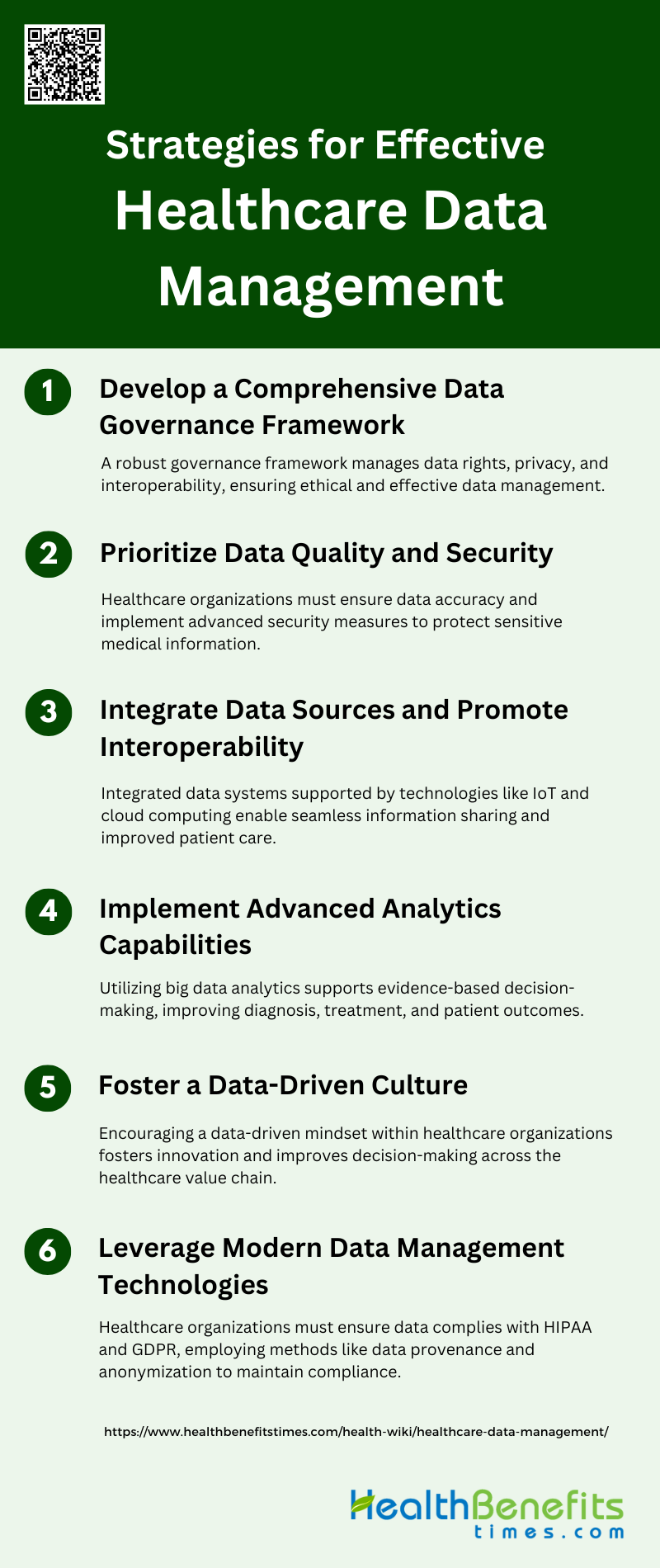Healthcare Data Management (HDM) refers to the systematic organization, storage, and retrieval of vast amounts of healthcare data generated from various sources such as electronic medical records, wearable devices, and clinical reports. The primary goal of HDM is to ensure that healthcare providers can access accurate and timely information to improve patient care, reduce costs, and enhance the overall efficiency of healthcare systems. This involves addressing challenges related to data privacy, security, and the integration of structured and unstructured data. Advanced technologies such as big data analytics, cloud computing, and blockchain are increasingly being utilized to manage and analyze healthcare data, providing insights that support early decision-making and personalized treatment plans.
Key Components of Healthcare Data Management
Effective healthcare data management is crucial for delivering high-quality patient care and ensuring operational efficiency. This involves several key components that work together to collect, store, clean, validate, integrate, and analyze data while maintaining security, privacy, and governance standards. Below are the essential components of healthcare data management:
1. Data Collection and Storage
Data collection and storage in healthcare involve acquiring vast amounts of data from various sources, including patient records, medical devices, and administrative systems. Effective data collection ensures that the data is accurate, complete, and timely, which is crucial for subsequent analysis and decision-making. Storage solutions must be robust and scalable to handle the increasing volume of data, often characterized by its unstructured nature. Big data technologies are frequently employed to manage this data, enabling healthcare organizations to store and retrieve large datasets efficiently.
2. Data Cleaning and Validation
Data cleaning and validation are critical steps in ensuring the quality and reliability of healthcare data. This process involves identifying and correcting errors, inconsistencies, and inaccuracies in the data. Effective data cleaning improves the accuracy of data analysis and decision-making processes. Validation ensures that the data meets predefined standards and is fit for its intended use. Techniques such as data harmonization and standardization are often employed to achieve high-quality data, which is essential for reliable healthcare outcomes.
3. Data Integration and Interoperability
Data integration and interoperability are essential for creating a unified view of patient information across different healthcare systems. This involves combining data from various sources and ensuring that different systems can communicate and exchange information seamlessly. Effective data integration supports better clinical decision-making and enhances patient care by providing comprehensive and accessible data. Interoperability standards and frameworks are crucial for achieving this integration, enabling different healthcare systems to work together efficiently.
4. Data Lifecycle Management
Data lifecycle management encompasses the entire process of managing data from its creation to its eventual disposal. This includes data acquisition, processing, storage, analysis, and archiving. Effective lifecycle management ensures that data is handled appropriately at each stage, maintaining its integrity and security. In healthcare, this is particularly important due to the sensitive nature of patient data. Implementing robust data lifecycle management practices helps in maintaining compliance with regulatory requirements and ensures that data is available for future use.
5. Data Security and Privacy
Data security and privacy are paramount in healthcare due to the sensitive nature of patient information. Protecting this data from unauthorized access, breaches, and cyber-attacks is critical. Advanced encryption methods, such as the Lionized remora optimization-based serpent (LRO-S) encryption, are employed to secure data both in transit and at rest. Ensuring data privacy involves implementing strict access controls and compliance with regulations such as HIPAA. Effective security measures not only protect patient data but also build trust in healthcare systems.
6. Data Governance
Data governance involves establishing policies, procedures, and standards for managing healthcare data. It ensures that data is accurate, consistent, and used ethically. Effective data governance frameworks address issues such as data ownership, data quality, and compliance with legal and regulatory requirements. By implementing strong data governance practices, healthcare organizations can ensure that data is managed responsibly and used to improve patient outcomes and operational efficiency.
7. Data Analytics and Business Intelligence
Data analytics and business intelligence (BI) in healthcare involve analyzing large datasets to derive insights that can improve patient care and operational efficiency. Big data analytics enables healthcare organizations to identify trends, predict outcomes, and make informed decisions. Tools and techniques such as predictive modeling and real-time analytics are used to support decision-making processes. By leveraging data analytics and BI, healthcare organizations can enhance their ability to manage resources, reduce costs, and improve overall healthcare delivery.
Challenges in Healthcare Data Management
Healthcare data management faces numerous obstacles that can hinder the delivery of quality care and operational efficiency. These challenges encompass issues related to data integration, privacy, quality, and regulatory compliance. Below are some of the primary challenges in healthcare data management:
1. Data Silos
Data silos in healthcare refer to the lack of integration across different healthcare systems, which hinders the seamless sharing and utilization of patient data. This fragmentation can lead to inefficiencies and suboptimal patient care. The AMIA’s 2012 Health Policy Meeting highlighted the need for widely agreed-on data stewardship principles to reduce or eliminate data silos and protect patient privacy. Additionally, the use of blockchain technology has been proposed to address data transparency, traceability, and flexible access, which can help break down these silos.
2. Data Privacy and Security
Data privacy and security are paramount in healthcare due to the sensitive nature of patient information. The increase in cyberattacks and data breaches, especially during the COVID-19 pandemic, has underscored the need for robust security measures in Electronic Health Records (EHR). Privacy-preserving data mining and machine learning techniques are being explored to secure data evaluation and processing. Federated Learning (FL) is another approach that allows data to remain decentralized, thus protecting privacy-sensitive medical data. However, challenges remain in ensuring the security and privacy of these systems.
3. Data Quality and Accuracy
Ensuring data quality and accuracy is critical for effective healthcare delivery. Issues such as incomplete, outdated, or incorrect data can lead to significant health threats for patients and responsibilities for clinicians, including fraud, misconduct, and inadequate treatment. Data provenance, which involves tracking the origins and history of data, is essential for maintaining data integrity and compliance with regulations like GDPR.
4. Interoperability Issues
Interoperability issues arise from the difficulty in sharing data across different platforms or organizations. The lack of standardized data formats and protocols can impede the seamless exchange of information. Blockchain technology has been suggested as a solution to improve interoperability by providing a decentralized and immutable ledger for data sharing. Additionally, the EHRChain framework aims to address interoperability along with other challenges such as privacy, security, and data integrity.
5. Resource Constraints
Resource constraints, including the costs of technology, training, and infrastructure, pose significant challenges to healthcare data management. Implementing advanced technologies like blockchain and federated learning requires substantial investment in infrastructure and training. The need for cost-effective solutions that can be easily integrated into existing systems is crucial for overcoming these constraints.
6. Compliance with Regulations
Compliance with regulations such as HIPAA and GDPR is essential for healthcare organizations to protect patient data and avoid legal repercussions. Data provenance is a key process for ensuring compliance, as it allows for tracking the sources and history of data generation and processing. The need for systemic oversight and sophisticated methods of data anonymization and protection is also emphasized to maintain compliance.
7. Rapid Technological Change
Keeping pace with rapid technological change is a significant challenge for healthcare organizations. The continuous evolution of technologies and standards requires ongoing adaptation and investment. Advances in AI and IoT have created new opportunities but also new security and privacy challenges. Ensuring that healthcare systems can adapt to these changes while maintaining data integrity and security is crucial for future success.
Opportunities in Healthcare Data Management
Healthcare data management offers numerous opportunities to enhance patient care, streamline operations, and drive innovation. By leveraging data effectively, healthcare organizations can unlock significant benefits across various aspects of their operations. Below are some key opportunities in healthcare data management:
1. Improved Patient Outcomes
The integration of digital technologies in healthcare, such as mobile health technologies and artificial intelligence (AI), has shown significant potential in improving patient outcomes. For instance, telehealth services facilitate remote patient monitoring, enhancing patient access to care and promoting self-management. AI supports predictive models and decision support, which are crucial in managing life-threatening conditions effectively. These advancements lead to better patient engagement and self-management, ultimately improving patient outcomes in various healthcare settings.
2. Operational Efficiency
Machine learning (ML) and AI are pivotal in enhancing operational efficiency within healthcare institutions. These technologies can predict operational events and identify key workflow drivers, thereby optimizing resource utilization and reducing costs. For example, ML algorithms can build strong models from numerous weakly predictive features, helping healthcare providers manage complex operations more effectively. This leads to more efficient healthcare delivery, reducing patient waiting times and improving overall service quality.
3. AI and Machine Learning
AI and ML are revolutionizing various aspects of healthcare, from early disease detection to personalized treatment plans. These technologies enhance diagnostic accuracy, treatment effectiveness, and patient risk stratification. Moreover, ML-based telemedicine and remote monitoring solutions have expanded healthcare accessibility, particularly in underserved areas. However, challenges such as data privacy, interoperability issues, and ethical considerations related to algorithm bias and transparency must be addressed to fully harness the potential of AI and ML in healthcare.
4. Interoperability Advancements
Interoperability is crucial for the seamless exchange of health information across different systems and platforms. The integration of technologies like the Internet of Things (IoT) and advanced analytics can create a rich health data foundation, enabling real-time interactions and evidence-based clinical decisions. However, challenges such as disparate data sources, limited adoption of data standards, and technical debt need to be overcome to maximize the value creation for all healthcare stakeholders.
5. Telemedicine and Remote Monitoring
Telemedicine and remote monitoring have the potential to significantly improve patient care by enabling real-time communication between patients and healthcare providers. These technologies are particularly effective in managing chronic conditions, reducing rehospitalization rates, and improving patient self-care. For example, virtual healthcare solutions have shown success in decreasing hospital visits and enhancing patient empowerment through integrated remote patient management systems.
6. Enhanced Research and Development
The use of big data analytics and IoT in healthcare provides numerous opportunities for research and development. These technologies facilitate the monitoring, diagnosis, and self-management of health issues, advancing personalized healthcare. By leveraging machine learning algorithms, researchers can analyze vast amounts of data to identify trends and develop innovative solutions for future healthcare challenges. This integrated approach supports continuous improvement in healthcare practices and outcomes.
7. Data-Driven Healthcare Policy
Data-driven healthcare policies can lead to more informed decision-making and better resource allocation. By utilizing advanced analytics and AI, policymakers can gain insights into healthcare trends, patient needs, and system inefficiencies. This evidence-based approach enables the development of policies that improve healthcare delivery, enhance patient outcomes, and optimize costs. However, it is essential to address data privacy and security concerns to ensure the ethical use of health information.
Strategies for Effective Healthcare Data Management
Effective healthcare data management requires a strategic approach to ensure data quality, security, and usability. By implementing targeted strategies, healthcare organizations can optimize their data management practices and enhance overall operational efficiency. Below are some key strategies for effective healthcare data management:
1. Develop a Comprehensive Data Governance Framework
A comprehensive data governance framework is essential for managing healthcare data effectively. This framework should establish clear policies and procedures for data rights, ownership, and usage to ensure equitable benefits from health data. It must also address data privacy and security concerns to build trust among patients and healthcare providers. For instance, a guiding framework for mHealth data sharing in low- and middle-income countries emphasizes the importance of regulatory frameworks for data rights and protection, as well as enhancing interoperability to advance healthcare services. By implementing such a framework, healthcare organizations can ensure that data is managed responsibly and ethically, promoting better health outcomes.
2. Prioritize Data Quality and Security
Ensuring high data quality and robust security measures is crucial in healthcare data management. A framework to assess the quality of healthcare data sources can help identify and address gaps in data governance, leadership, and management. Additionally, implementing advanced security frameworks, such as those based on hyperchaotic and DNA encryption, can protect sensitive medical data from cyber threats. Prioritizing data quality and security not only safeguards patient information but also enhances the reliability of data used for clinical decision-making and research, ultimately improving patient care and outcomes.
3. Integrate Data Sources and Promote Interoperability
Integrating various data sources and promoting interoperability are key strategies for effective healthcare data management. The continuous proliferation of complex healthcare data necessitates a data-driven paradigm that supports robust and sustainable health information systems. By leveraging technologies such as cloud computing, IoT, and big data analytics, healthcare organizations can create integrated systems that facilitate seamless data sharing and real-time access to patient information. This integration enables more accurate diagnoses, better patient outcomes, and more efficient healthcare delivery.
4. Implement Advanced Analytics Capabilities
Implementing advanced analytics capabilities is essential for harnessing the full potential of healthcare data. Big data analytics can help determine causes of diseases, enhance clinical care, and generate accurate predictions of readmissions. A comprehensive roadmap for big data analytics in healthcare, such as the Med-BDA architecture, can address current challenges and provide success strategies for effective implementation. By utilizing advanced analytics, healthcare organizations can gain valuable insights that support evidence-based decision-making and improve overall healthcare quality.
5. Foster a Data-Driven Culture
Fostering a data-driven culture within healthcare organizations is vital for maximizing the benefits of data management. This involves promoting the use of data analytics in decision-making processes and encouraging staff to embrace data-driven insights. For example, big data analytics can support people management decisions and enhance efficiency along the healthcare value chain. By cultivating a culture that values data and its applications, healthcare organizations can drive innovation, improve patient care, and achieve better health outcomes.
6. Leverage Modern Data Management Technologies
Leveraging modern data management technologies is crucial for effective healthcare data management. Technologies such as big data analytics, IoT, and cloud computing offer significant advantages in terms of data storage, processing, and analysis. For instance, the adoption of big data analytics can help healthcare organizations understand patterns of care, support decision-making, and enhance predictive capabilities. By integrating these technologies into their data management strategies, healthcare organizations can improve the efficiency and effectiveness of their services, ultimately leading to better patient outcomes and operational performance.
Emerging Trends in Healthcare Data Management
The landscape of healthcare data management is rapidly evolving, driven by technological advancements and the need for more efficient and secure data handling. These emerging trends are reshaping how healthcare organizations manage and utilize data. Below are some of the key emerging trends in healthcare data management:
1. Rise of Big Data and Healthcare Analytics
The rise of big data in healthcare has revolutionized the way medical data is managed and analyzed. With the integration of big data analytics, healthcare systems can now process vast amounts of data to improve patient outcomes, streamline operations, and reduce costs. The incorporation of big data analytics allows for more accurate prognoses and diagnoses, supporting better decision-making in patient care. Additionally, the use of big data in healthcare enables the identification of patterns and trends that can lead to the development of effective prevention plans and personalized treatment strategies. This transformation is driven by the need for real-time smart health information management systems that can handle the increasing volume and complexity of medical data.
2. Adoption of Blockchain for Secure Data Sharing
Blockchain technology is increasingly being adopted in healthcare to address security and privacy concerns associated with data sharing. Blockchain provides a decentralized and secure framework for managing healthcare data, ensuring data integrity and protecting patient privacy. For instance, blockchain can be used to securely share electronic health records (EHRs) among patients and healthcare providers, reducing the risk of data breaches and unauthorized access. The integration of blockchain with other technologies, such as deep learning and federated learning, further enhances the security and efficiency of data sharing in healthcare systems. Despite its potential, challenges such as high computational costs and the need for advanced cryptographic techniques must be addressed to fully leverage blockchain in healthcare.
3. Cloud-Based Healthcare Data Management
Cloud-based healthcare data management systems offer numerous benefits, including low operational costs, high flexibility, and improved data availability. By integrating mobile devices with cloud computing, healthcare providers can facilitate seamless data exchanges and real-time access to medical records. This model supports the efficient sharing of EHRs and other health data among patients, healthcare providers, and insurance companies, enhancing collaboration and improving patient care. However, the adoption of cloud-based systems also raises concerns about data privacy and network security. To address these issues, innovative solutions such as combining blockchain with cloud platforms have been proposed to ensure secure and reliable data sharing.
4. Wearables and IoT Devices Contributing to Real-Time Health Data
Wearable devices and the Internet of Things (IoT) are playing a crucial role in the collection and real-time monitoring of health data. These technologies enable continuous tracking of patients’ health status, providing valuable insights for timely diagnosis and treatment. The integration of IoT-based wearable technology with healthcare systems allows for remote patient monitoring, which is particularly beneficial for managing chronic conditions and elderly care. However, the widespread use of IoT devices also introduces significant privacy and security challenges. To mitigate these risks, blockchain technology can be employed to secure data transactions and ensure the anonymity of health data. The combination of IoT and blockchain offers a promising solution for enhancing the reliability and security of real-time health data management.
FAQs
1. How does healthcare data management impact patient privacy?
Healthcare data management plays a critical role in safeguarding patient privacy. By employing encryption technologies, access controls, and privacy-preserving machine learning techniques, organizations can ensure that sensitive patient data remains secure while still enabling effective data sharing and analysis.
2. What role does Artificial Intelligence (AI) play in healthcare data management?
AI aids in healthcare data management by automating data collection, cleaning, and analysis processes. It enables predictive analytics, early diagnosis, and personalized treatment plans by analyzing large datasets. AI can also help identify data errors and inconsistencies that could otherwise compromise patient care.
3. What is the difference between data interoperability and data integration in healthcare?
Data integration refers to combining data from various sources into a single unified system, while interoperability focuses on ensuring that different systems can communicate and exchange information seamlessly. Integration collects data; interoperability ensures systems understand and use that data efficiently.
4. How can blockchain improve healthcare data security and sharing?
Blockchain provides a decentralized ledger system that ensures secure and transparent data sharing. It prevents unauthorized access and modifications, enhances traceability, and ensures data integrity, making it highly beneficial for sharing sensitive healthcare information between organizations.
5. What challenges do wearable devices and IoT present in healthcare data management?
While wearables and IoT devices offer real-time health monitoring, they introduce challenges related to data privacy, security, and integration. Managing vast amounts of unstructured data from these devices requires robust systems that can handle security concerns, data accuracy, and storage capacities.
6. How can healthcare organizations overcome the high cost of implementing advanced data management technologies?
Healthcare organizations can mitigate high costs by adopting cloud-based solutions, leveraging open-source software, and gradually integrating advanced technologies like AI, machine learning, and blockchain. Partnerships and government incentives can also help reduce financial burdens.
7. What is the importance of data governance in healthcare data management?
Data governance ensures the ethical and responsible use of healthcare data. It establishes rules and policies regarding data ownership, quality, privacy, and security, which are essential for regulatory compliance and ensuring patient trust in the healthcare system.
8. How does data quality affect patient outcomes in healthcare?
Poor data quality, such as incomplete or inaccurate information, can lead to misdiagnoses, incorrect treatment plans, and patient safety risks. High-quality data is essential for accurate decision-making and improving patient outcomes through reliable analysis and personalized care.
9. How do healthcare organizations manage the lifecycle of patient data?
Healthcare organizations follow data lifecycle management practices that include data acquisition, storage, processing, and eventual disposal. Proper management ensures data is available for decision-making while complying with regulations like HIPAA and GDPR, ensuring patient confidentiality throughout its lifecycle.
10. What are some best practices for maintaining compliance with healthcare regulations?
To maintain compliance, healthcare organizations must implement data anonymization, encryption, and audit trails, regularly update security measures, and follow frameworks like HIPAA and GDPR. Additionally, continuous staff training on data privacy and security protocols is vital for compliance.







